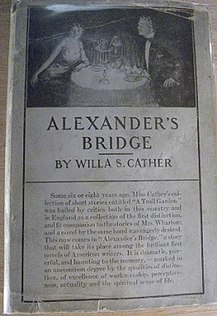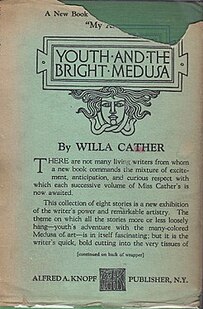
Alexander's Bridge is the first novel by American author Willa Cather. First published in 1912, it was re-released with an author's preface in 1922. It also ran as a serial in McClure's, giving Cather some free time from her work for that magazine.

One of Ours is a novel by Willa Cather that won the 1923 Pulitzer Prize for the Novel. It tells the story of the life of Claude Wheeler, a Nebraska native around the turn of the 20th century. The son of a successful farmer and an intensely pious mother, he is guaranteed a comfortable livelihood. Nevertheless, Wheeler views himself as a victim of his father's success and his own inexplicable malaise.
The Westbound Train is a short story by Willa Cather. It was first published in Courier in September 1899.
"Nanette: An Aside" is a short story by Willa Cather. It was first published in Courier on 31 July 1897 and one month later in Home Monthly.
"A Gold Slipper" is a short story by Willa Cather. It was first published in Harper's in January 1917.
The Bookkeeper's Wife is a short story by Willa Cather. It was first published in Century in May 1916.
Her Boss is a short story by Willa Cather. It was first published in Smart Set in October 1919.
On the Divide is a short story by Willa Cather. It was first published in Overland Monthly in January 1896.
The Count of Crow's Nest is a short story by Willa Cather. It was first published in Home Monthly in October 1896.
A Singer's Romance is a short story by Willa Cather. It was first published in Cosmopolitan in July 1900.
The Affair at Grover Station is a short story by Willa Cather. It was first published in Library in June 1900 in two installments, and reprinted in the Lincoln Courier one month later.
The Profile is a short story by Willa Cather. It was first published in McClure's in June 1907.
Flavia and Her Artists is a short story by American writer Willa Cather. It was first published in The Troll Garden in 1905.
The Garden Lodge is a short story by Willa Cather. It was first published in The Troll Garden in 1905
The Treasure of Far Island is a short story by Willa Cather. It was first published in New England Magazine in October 1902.

My Mortal Enemy is the eighth novel by American author Willa Cather. It was first published in 1926.
"The Diamond Mine" is a short story by Willa Cather. It was first published in McClure's in October 1916.

The Willa Cather Foundation is an American not-for-profit organization, headquartered in Red Cloud, Nebraska, dedicated to preserving the archives and settings associated with Willa Cather (1873–1947), a Pulitzer Prize-winning author, and promoting the appreciation of her work.

Youth and the Bright Medusa is a collection of short stories by Willa Cather, published in 1920. Several were published in an earlier collection, The Troll Garden.








